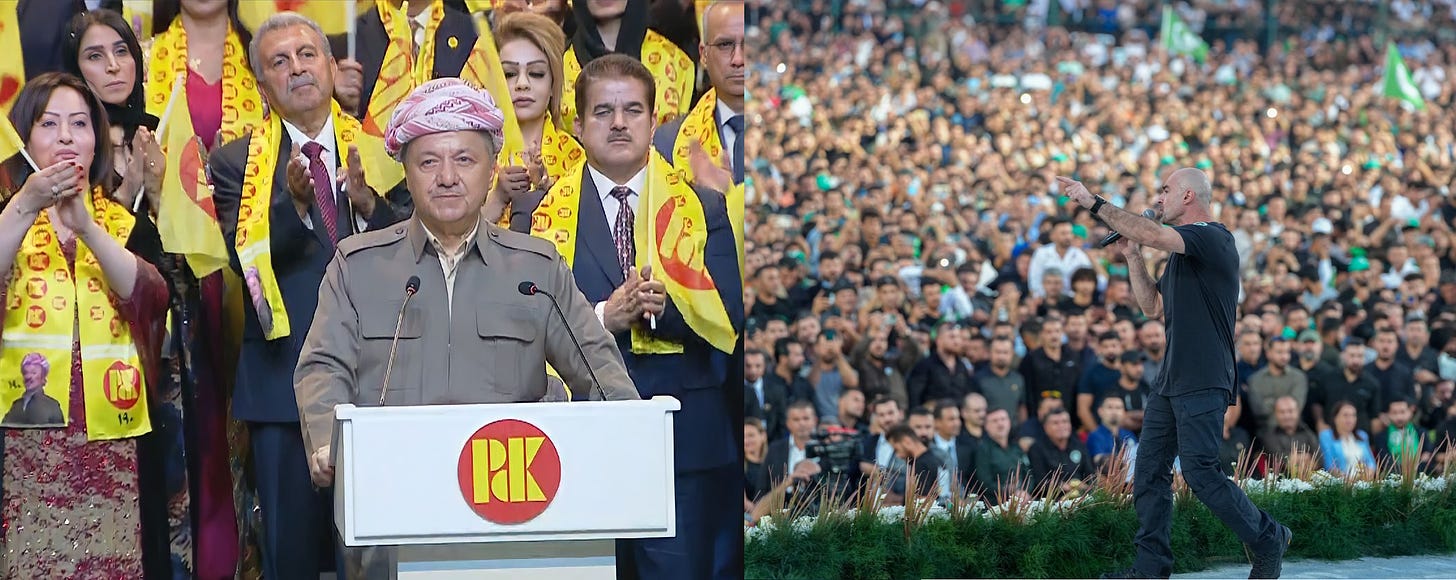Kurdistan Election Campaign: Barzani as the Voice of Restraint, Talabani as the Anti-Establishment Challenger
The Kurdistan Region's election campaign is increasingly fought between the KDP and the PUK with the two parties' media war taking center stage. Bafel Talabani's speech yesterday at the PUK campaign launch delivered the harshest anti-KDP rhetoric from the party in recent memory. For the first time in two decades, opposition parties are finding themselves pushed to the sidelines, their campaigns fading into the background as the KDP and PUK dominate public attention. The massive media machines of these two major parties easily control the political agenda, leaving little room for other voices in the electoral discourse (with the exception of New Generation that controls NRT TV).
The campaign has taken a personal turn, with the PUK focusing its criticism on Masrour Barzani rather than the KDP as a whole, seemingly attempting to create a rift between him and Nechirvan Barzani. This prompted Masoud Barzani to declare, "Those who dream of factionalism within the KDP will be disappointed."
The KDP's campaign, led by Masoud Barzani, has adopted a more measured tone. Barzani urged supporters: "Remain calm during this election and avoid harsh language. Don't engage in unnecessary conflicts. Often, not responding to provocations is itself a response. If a response is necessary, it should be done appropriately. Remember: those with long tongues often have short reach." This speech, delivered to a select audience at the campaign launch, aligns with the KDP's theme of continuity and stability.
In contrast, Bafel Talabani's speech at the PUK's campaign launch in Sulaimani struck a different chord. Addressing a packed stadium, Talabani delivered a dynamic and provocative address - in some ways similar in style to Trump's election campaign, positioning the PUK as an outsider force despite its long-standing role in government. The party's slogan, "We will end it," underscores this approach. Talabani specifically targeted Masrour Barzani, alleging that a single "family" has monopolized power. He portrayed himself and the PUK as anti-establishment reformers, emphasizing their recent successes in disputed territories like Kirkuk and Mosul, and claiming to be the only viable alternative to the KDP capable of addressing regional governance imbalances.
The divergent campaign strategies may reflect the parties' different electoral prospects. The KDP's voter base in Duhok and Erbil is relatively stable, making their seat count more predictable. The PUK, while having a smaller but loyal base, has the potential to attract swing voters, including those who previously supported the Gorran movement and other parties. This fluidity makes predicting the PUK's seat count more challenging.
Barring significant surprises, the KDP is likely to maintain its position as the top party. The key question is how many seats the PUK will secure and what the gap between the two parties will be, as this will influence post-election government formation. However, indications suggest that the new KRG cabinet is unlikely to be formed until after next year's Iraqi parliamentary elections, regardless of the outcome.




